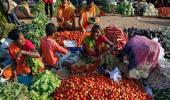High vegetable prices are expected to keep food inflation firm in the months to come.

Food inflation has emerged as one of the main talking points of the Lok Sabha polls.
Uneven weather coupled with prolonged heat waves and low post-2023 monsoon rains in several parts of the country has impacted supplies of major vegetables in 2024.
Though, on a week-on-week basis, there has been some moderation in prices but compared to last year, prices of most major vegetables have seen a sharp spike.
Among vegetables, potato prices have been particularly noteworthy due to the sharp spike in prices seen since March 2024.
Traders said some damage to the crop which has pulled down output and high storage and transportation costs has pushed up prices of potatoes this time.

High vegetable prices are expected to keep food inflation firm in the months to come.
'Heat waves have swept several parts of the country over the last few weeks with states such as Gujarat and Rajasthan experiencing 9 to 12 days of heat waves (higher than normal). This has added to price pressures for vegetables, fruits, milk, pulses among others,' QuantEco Research said in a note.
'While significant, the price pressures due to severity of heat waves in May 24 looks to be somewhat less than historical trend. As such there is likely to be downside risk to our estimate of a severe heat wave adding close to Rs 200 bps to perishables inflation and Rs 25 to Rs 30 bps to headline CPI inflation,' QuantEco Research added.
Going forward, the trajectory of the southwest monsoon will determine how veggie prices fare in the coming months.
A good and early monsoon will help boost supplies and pull down prices, but a prolonged dry spell will keep prices on the boil as vegetables tend to get damaged quickly in intense heat.
This is all the truer for India as the country's storage and transportation infrastructure for fresh fruits and vegetables is grossly inadequate in comparison to the volume of production.
Dr Vishwas Chitale, senior programme lead, Council on Energy, Environment and Water, suggested in a note that to build resilience against heat waves, India's heat action plans must shift from a response-centric to a preparedness-centric approach, mapping granular-level heat risks to help administrators prioritise health interventions.












 © 2025
© 2025